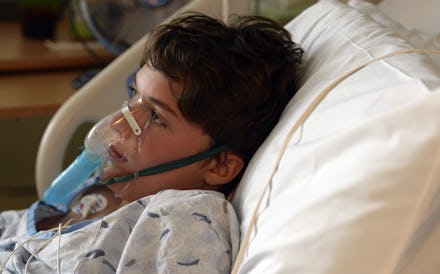A Mysterious Illness Has Sickened More than 1,000 Kids Across the U.S.

The news: Hundreds of children have been sent to hospitals throughout the Midwest as clusters of a rare viral infection spread across the country, with CNN reporting outbreaks in Missouri, Colorado, North Carolina, Georgia, Ohio, Iowa, Illinois, Kansas, Oklahoma and Kentucky.
The Washington Post reported the infection is thought to be Enterovirus 68 (EV-D68), a respiratory infection that causes symptoms similar to a cold, including "coughing, wheezing and low blood oxygen levels (also known as hypoxemia)."
Usually, the symptoms are much more severe than a regular cold, but they typically don't require hospitalization — this outbreak is different. In Kansas City, Mo., more than 30 children a day are being admitted to one hospital, and roughly 15% of those were admitted to the intensive care unit.
As of late last week, Denver alone was reporting 900 cases. Jennifer Cornejo, mother of 13-year-old Will, told Denver's 7News that her son "was in really bad shape. He came really close to death. He was unconscious at our house and white as a ghost with blue lips — he just passed out."
Why this is important: Children's Mercy Hospital infectious disease director Dr. Mary Anne Jackson told CNN, "It's worse in terms of scope of critically ill children who require intensive care. I would call it unprecedented. I've practiced for 30 years in pediatrics, and I've never seen anything quite like this."
There is currently no vaccine for EV-D68, which had previously been considered very rare with just 100 reported infections since the 1960s. According to the CDC, the disease may "contribute to patient death," but only a handful have resulted in death (and none in the United States). No one knows how the outbreak began or its specific mechanism of transmission, but doctors do know that it can be particularly severe in patients with asthma or other pre-existing respiratory conditions.
So far, the response from the CDC has been relatively modest: They're advising people in the affected areas to wash hands regularly, avoid physical contact with the sick and practice good hygiene — things that disease-wary people should be doing anyway. But the rapidly spreading infection adds some urgency for parents, who should take extra measures to protect their children this year.
The good news: Vanderbilt University preventive medicine expert Dr. William Schaffner told CNN, "All of these folks are going to get better." Few patients remain hospitalized after five days, and Schaffner told NBC that he expects the illness to wane within a week or so.
Still, he added it was a "mystery" how viruses spread around the country seemingly randomly, underscoring that poorly-understood infectious diseases can still pop up with alarming frequency even in our modern medical system. Even if not every disease is that dangerous, it's alarming to know how helpless we can be in these situations.